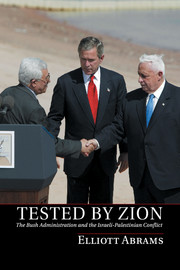Book contents
- Frontmatter
- Contents
- Acknowledgments
- Introduction
- 1 Early Days
- 2 9/11 and the Search for a Policy
- 3 Roadmap to Disengagement
- 4 “New Realities on the Ground”
- 5 Arafat, Disengagement, Sharon
- 6 Olmert – Peace or War?
- 7 War in Lebanon – and Condi
- 8 From Mecca to Annapolis
- 9 The “Meeting” at Annapolis
- 10 Two Trips to Jerusalem
- 11 Final Days in Gaza and Turtle Bay
- 12 Lessons Learned
- 13 Conclusion
- Index
- References
7 - War in Lebanon – and Condi
Published online by Cambridge University Press: 05 January 2013
- Frontmatter
- Contents
- Acknowledgments
- Introduction
- 1 Early Days
- 2 9/11 and the Search for a Policy
- 3 Roadmap to Disengagement
- 4 “New Realities on the Ground”
- 5 Arafat, Disengagement, Sharon
- 6 Olmert – Peace or War?
- 7 War in Lebanon – and Condi
- 8 From Mecca to Annapolis
- 9 The “Meeting” at Annapolis
- 10 Two Trips to Jerusalem
- 11 Final Days in Gaza and Turtle Bay
- 12 Lessons Learned
- 13 Conclusion
- Index
- References
Summary
On July 12, 2006, Hizballah attacked Israel with rockets and mortars, and Hizballah terrorists stormed across the Israel-Lebanon border, attacking a squad of Israeli soldiers. They killed eight soldiers and kidnapped two, although whether either was by then alive or how long those two stayed alive remained unclear. This action started the Lebanon War, which is worth describing briefly, because though it did not affect Israeli-Palestinian issues directly, it had an enormous impact on U.S.-Israel relations, especially on Condi Rice's view of and relations with Israeli officials and on Olmert's political fate. On July 13, Israel struck back at Hizballah, with air and artillery; Hizballah raised the ante with rocket attacks on Israeli villages and towns, including Haifa, averaging about 100 rockets a day. Israel's air strikes and artillery were soon joined by ground operations, and the targets included not only Hizballah leadership, weapons caches, and rocket launch sites but also parts of the Lebanese infrastructure that Hizballah used. Hizballah continued its rocket fire at Israeli towns, and soon hundreds of thousands of Israelis were either living in bomb shelters or had evacuated toward the south; similarly, hundreds of thousands of Lebanese fled the fighting, moving north. During the war, 157 Israelis and roughly 1,000 Lebanese were killed. The fighting lasted for a month, ending with UN Security Council Resolution 1701, passed on August 11 and accepted by Israel on August 13. The text demanded an end to the fighting and an Israeli withdrawal from Lebanon. To prevent a recurrence, the resolution called for an enlargement of the UN's force in southern Lebanon, UNIFIL, to 15,000 and the deployment of 15,000 Lebanese Army troops in the same area, with the goal of ending Hizballah's control there. Resolution 1701 also required that no outside power rearm Hizballah; arms could go only to the Lebanese Army. Finally, it demanded the release of the two kidnapped Israeli soldiers (whose bodies were finally exchanged with Israel in July 2008).
- Type
- Chapter
- Information
- Tested by ZionThe Bush Administration and the Israeli-Palestinian Conflict, pp. 179 - 211Publisher: Cambridge University PressPrint publication year: 2013



